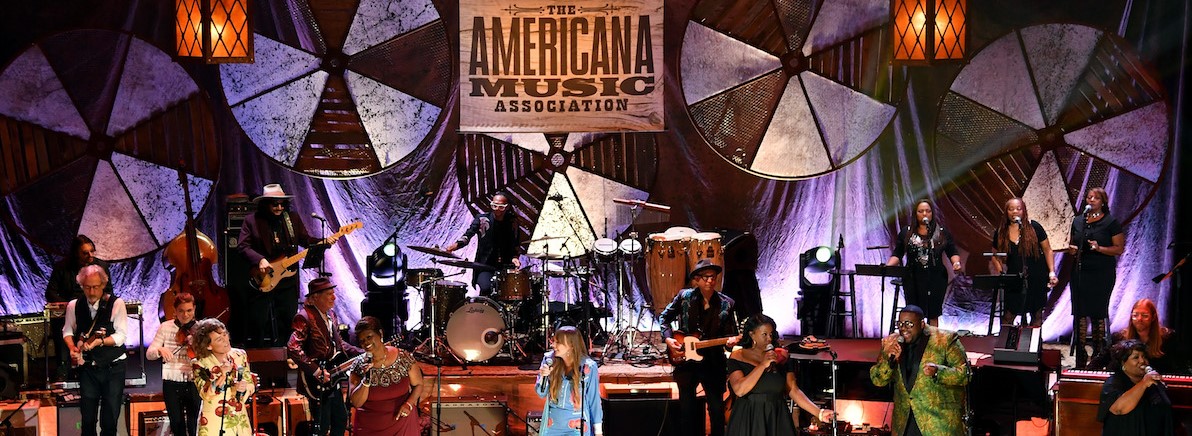A treat: New release collects Guy Clark on @DualtoneRecords@guyclarkkca. It draws on three studio albums and a live album, capping off a lifetime of musical integrity. We had the chance to interview Guy a few months before his passing for “The Songwriters,” a new TV show set to debut in January on WNPT in Nashville. He was gracious and funny.
Here’s a live performance by Guy Clark and Verlon Thompson of “The Guitar:”
Tag: “Guy Clark”
Review: Guy Clark in concert
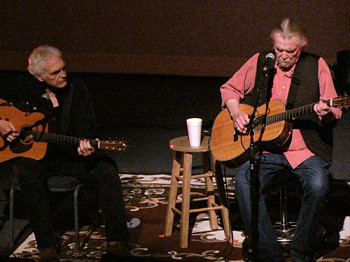
Verlon Thompson and Guy Clark
By Paul T. Mueller
–There’s no denying that Guy Clark’s March 23 concert at the historic Crighton Theatre in Conroe, Texas, had the air of a memorial service about it. The legendary singer-songwriter, a Texas native who’s lived in Nashville for many years, has been in ill health for several years; it seems likely that his ailments and possibly age (Clark turned 71 in November) are behind recent declines in his singing, playing and memory.
But if the audience came to pay its respects, that wasn’t necessarily what the object of their admiration had in mind. After walking slowly onstage with the help of a cane (a souvenir, perhaps, of a broken leg suffered a few years ago), Clark opened the show with three songs from a forthcoming album: “I’ll Show Me,” a how-to guide to being one’s worst enemy; “My Favorite Picture of You,” a tribute to his beloved wife, Susanna, who died last year, and “El Coyote,” about the grim business of immigrant smuggling in South Texas. Accompanied throughout the show by his old friend Verlon Thompson, himself an accomplished songwriter and performer as well as a monster guitar player, Clark followed with a couple of older favorites: “The Cape,” an ode to the power of faith, and “Like a Coat from the Cold,” an earlier valentine to Susanna.
Then Clark made the first of two temporary exits from the stage – “There’s something in my throat,” he said, before relating how his pants fell down in the course of a similar exit during a show a few days earlier. Thompson was left to fill in, a task he handled with impressive style and grace. Suddenly solo, he played “Everywhere … Yet,” a lively name-check of many venues he’s played over the years, and a look forward at more to come (“We ain’t been everywhere … yet”) and “The Guitar,” co-written with Clark, which skated the line between eerie and hokey, but served as a fine vehicle for Thompson’s acoustic guitar wizardry.
One of the more moving aspects of the show was Thompson’s humorous attempts to ease the awkwardness caused by Clark’s frequent hesitations and memory lapses as he struggled to get through the songs he once played so fluidly. After Clark returned from his first hiatus, complaining of feeling queasy and sighing, “I don’t know how I do it,” Thompson got some laughs with the comeback, “Let’s hold off on your food songs for now.” What followed was a lovely sequence that included “L.A. Freeway” and “She Ain’t Goin’ Nowhere” (of which Clark said, “This is actually my favorite song”).
The reverent atmosphere was broken by a volley of shouted requests, but the sometimes irascible Clark wasn’t having it. “Just settle down,” he told the audience, in a tone that didn’t sound all that lighthearted, “and let me get this taken care of.” After a pause, he moved on to “The Randall Knife,” with the help of some lyrical prompting from Thompson; “Homegrown Tomatoes,” which fortunately didn’t provoke any unpleasant side effects, and “Boats to Build,” in which Clark and Thompson traded verses.
Clark also seemed to be trying to lighten the mood by making light of his own infirmities. “I’m playin’ hurt, man,” he told Thompson at one point, to which the reply was, “Yeah, and there ain’t a relief man in the bullpen.” Thompson, of course, was the relief man, giving Clark a breather by launching into a spirited rendition of “Joe Walker’s Mare.” After a second slow exit by his friend, Thompson continued with several originals about his parents in Oklahoma – “Sweet Dreams,” “Darwettia’s Mandolin” and “Caddo County.”
Upon his return (accompanied by the sweet tones of what Thompson called “traveling music”), Clark closed out the set with two final favorites, both tributes, at least in part, to his late wife – “Stuff That Works” and the beautiful and moving “Dublin Blues.”
There’s something to be said for leaving at the top of one’s game; for Guy Clark that may no longer be an option. But there’s also a lot to be said for giving one’s fans another chance, maybe a last chance, to show their love and appreciation, and it’s fair to say that the large majority of those in attendance were happy to get that chance.
Austin singer-songwriters Brennen Leigh and Noel McKay opened the show with a well-received set that showcased their songwriting abilities, fine harmonies and impressive guitar skills. Highlights included the very funny “Let’s Go to Lubbock on Vacation” and “That’s What I Meant to Say,” in addition to grittier fare such as “Sleeping with the Devil.”
Follow Sun209: Americana Music News on Twitter at @Sun209com.
2012 Americana Music Awards nominees announced

Robert Plant and Patty Griffin at the 2011 Americana music awards show
The nominees:
ALBUM OF THE YEAR
Here We Rest – Jason Isbell and the 400 Unit
I’ll Never Get Out of This World Alive – Steve Earle
The Harrow & The Harvest – Gillian Welch
This One’s For Him: A Tribute to Guy Clark – Various Artists
ARTIST OF THE YEAR
Gillian Welch
Hayes Carll
Jason Isbell
Justin Townes Earle
EMERGING ARTIST OF THE YEAR
Alabama Shakes
Dawes
Deep Dark Woods
Robert Ellis
SONG OF THE YEAR
“Alabama Pines” – Written by Jason Isbell and performed by Jason Isbell and the 400 Unit
“Come Around” – Written and performed by Sarah Jarosz
“I Love” – Written by Tom T. Hall and performed by Patty Griffin
“Waiting on the Sky to Fall” – Written and performed by Steve Earle
INSTRUMENTALIST OF THE YEAR
Buddy Miller
Chris Thile
Darrell Scott
Dave Rawlings
DUO / GROUP OF THE YEAR
Carolina Chocolate Drops
Civil Wars
Gillian Welch and David Rawlings
Jason Isbell and the 400 Unit
Punch Brothers
Charting: Amos Lee, Elliott Brood, Punch Brothers, Chuck Mead and Dunwells
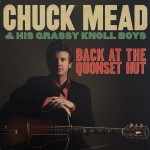 They don’t make elections this close: The top 3 slots on this week’s Americana Music radio airplay chart include the Little Willies’ For the Good Times with 389 spins, Darrell Scott’s Long Ride Home, also with 389 spins, This One’s For Him, the Guy Clark tribute with 388.
They don’t make elections this close: The top 3 slots on this week’s Americana Music radio airplay chart include the Little Willies’ For the Good Times with 389 spins, Darrell Scott’s Long Ride Home, also with 389 spins, This One’s For Him, the Guy Clark tribute with 388.
New to the chart this week: Amos Lee’s As the Crow Flies at #28, Elliott Brood’s Days Into Years at #31, the Punch Brothers’ Who’s Feeling Young Now? at #35, Chuck Mead and the Grassy Knoll Boys’ Back at the Quonset Hut at #37 and the Dunwells’ Blind Sighted Faith at #39.
Chuck Mead told us about the Quonset Hut project in December.
You’ll find the audio interview here.
Guy Clark tribute #1; Ani DeFranco, Orbo & Longshots, Sons of Fathers enter chart
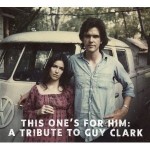 This One’s For Him, the outstanding double-CD tribute to Guy Clark, lands in the #1 spot this week after a steady run up the Americana Music radio airplay chart. You’ll find our review here.
This One’s For Him, the outstanding double-CD tribute to Guy Clark, lands in the #1 spot this week after a steady run up the Americana Music radio airplay chart. You’ll find our review here.
New to the chart this week:
– At #17, the massive Chimes of Freedom tribute to Bob Dylan. The album, with a generation-spanning line-up of artists (Patti Smith, My Morning Jacket, Lucinda Williams, the Belle Brigade, Joan Baez and Jackson Browne among them) benefits Amnesty International.
– At #29, Ani DeFranco’s Which Side Are You On?
– At #32, Orbo and the Longshots’ Prairie Sun.
– At #37 , the self-titled album by Sons of Fathers
– At #38, Lincoln Durham’s The Shovel vs. The Howling Bones
And this note: The much-debated Grammy nominee Linda Chorney had one of the most-added albums on Americana music radio this week, with 10 stations picking up Emotional Jukebox.
(Follow Sun209 on Twitter at sun209com and on Facebook.)
Guy Clark tribute, Charlie Faye, Imelda May enter Americana charts
 The Americana Music Association Radio Chart is back after a month-long hiatus, and Ryan Adams’ Ashes & Fire (PAX-AM/Capitol) remains at the top. Taking the holidays off is an odd call for an association promoting a genre that still needs to build its brand and visibility. And it’s not as though all those Americana stations just played Christmas music over the past month.
The Americana Music Association Radio Chart is back after a month-long hiatus, and Ryan Adams’ Ashes & Fire (PAX-AM/Capitol) remains at the top. Taking the holidays off is an odd call for an association promoting a genre that still needs to build its brand and visibility. And it’s not as though all those Americana stations just played Christmas music over the past month.
On to 2012: The outstanding Guy Clark tribute This One’s For Him debuts at number six on the chart, with 16 new stations adding it in the last week. The double-CD set features classic material by some of Americana music’s most prominent artists (Emmylou Harris, Kris Kristofferson, John Prine and Jerry Jeff Walker among them). Expect a long chart run.
Other chart debuts: Charlie Faye’s Travels with Charlie (Wine & Nut) enters the chart at #22, Danny Barnes’ Rocket (ATO) comes in at #33 and Imelda May’s Mayhem (Decca) is at #35.
After the Guy Clark project, these albums were the most added: The Little Willies’ For the Good Times (Milking Bull/EMI), Reckless Kelly’s Good Luck and True Love (No Big Deal Records) and Orbo and the Longshots’ Prairie Sun (Blue Mood.)
(You can follow Sun209.com on Twitter (Sun209com) and Facebook.)
Reviews: Dirt Drifters, Chris Isaak,Verlon Thompson, more
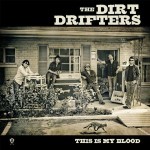 By Ken Paulson
By Ken Paulson
– As we close out 2011, there’s still a stack of CDs we’ve been meaning to write about. Here’s a quick round-up of noteworthy 2011 Americana music releases:
The Dirt Drifters – This Is My Blood: We first came across the Dirt Drifters at a free-speech benefit in Nashville in 2009; they had tremendous energy on stage and we looked forward to their recording. This album has been in the pipeline for a while, but it was worth the wait. This is vibrant music at the intersection of rock and country. “Married Men and Motel Rooms” and “Something Better” smack of “Guitar Town”-era Steve Earle – and that’s a very good thing.
Chris Isaak – Beyond the Sun: Chris Isaak’s new album is a salute to the great music recorded in the legendary Sun Records studio. Isaak says he was honored when Sun founder Sam Phillips once named him as a favorite singer; he’s returned the compliment with impeccable renditions of songs like “I Forgot to Remember to Forget,” “Trying to Get To You” and the truly vintage “My Happiness.” Beyond the Sun makes the classics contemporary.
Dean Fields – Under A Searchlight Moon – This has no filler; just five smart songs that ring true. “You get pretty; you just keep going, that’s why we’re late for everything we ever do,” Fields sings in “Forever Never Knowing,” one of a number of songs that suggest real relationships set to music.
Edwina Hayes – Good Things Happen Over Coffee – Good things also happen at Nashville parties when a talented British visitor joins an impromptu jam session. That’s where we first heard Edwina Hayes’ impressive vocals. Clearly, Nanci Griffith is an inspiration to this young singer. Griffith offers a supportive quote in Hayes’ press materials and the album features “Speed of the Sound of Loneliness,” a John Prine song covered earlier by Griffith. Hayes’ own evocative songs run to the sad, particularly “Nobody’s Coming Around.”
Verlon Thompson –Works: Verlon Thompson is perhaps best known for his work in tandem with Guy Clark, and it’s good to see him take a solo turn on the engaging Works. Highlights include “The Show We Call the Business,” an apt song about Thompson’s line of work, and the Clark co-writes “The Guitar” and “The Ballad of Stringbrean and Estelle,” a compelling account of the night on which the Opry performer and his wife were robbed and murdered.
The Vespers – Tell Your Mama – OK, so this album actually came out in 2010, but we didn’t hear the Vespers until this year at the Americana Music Festival. This is tasteful, inspired folk, fueled by the sterling harmonies of the Cryar sisters. The Vespers are very young and very talented.
Ricky Skaggs interview: Staying true to faith and music
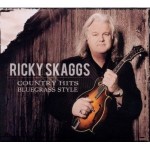 By Terry Roland
By Terry Roland
– Ricky Skaggs has made several critical transitions in both his musical and spiritual lives. Although few can argue with his success, there have been some detours and U-turns along the way. This is one of the many things that make Ricky Skaggs such a compelling and enduring figure in American music. As a carrier of the ‘80s and ‘90s ‘new traditionalists’ label in country music, he was once given the Country Music Association’s Entertainer of the Year award.
He’s also won multiple Grammy awards over the years, no small accomplishment for a popular country artist who devoted himself to artistic integrity while piling up country hits like Guy Clark’s “Heart Broke.” In the mid-‘90s, he returned to his bluegrass roots in response to his own spiritual calling and in order to help carry on the legacy of bluegrass music created by his friend and mentor, Bill Monroe. Ricky has established his own family record label and become one of the elder statesmen of the genre. In this interview, he gives honest insight into the motivation behind his career decisions and how his own spiritual commitment and love of good and authentic music has given his career direction and depth.
TR: So you just finished a tribute album for Linda McCartney?
RS: Yes. The track came out good … The album was about all done and I got a call the last minute. They needed an extra track and somebody said, ‘Let’s get Ricky.’ I had just lost my sister to cancer. It was such a God thing. You know, you get a wink from God from time to time. She’d just died on the 12th of September. They called the next week for the track. We went into the studio. What you hear in that song is just the joy. It’s my heart being joyous for my sister. These were God moments. It was really healing for me. Hopefully it will raise some awareness about cancer.
TR: Tell me about the new Christmas album.
RS: It’s a continuation of the first one. During our first year out doing Christmas shows, the kids were much younger. It was 2004. We were doing home family projects. We liked to just sit around doing holiday songs. I grew up in Kentucky and my mom would sing all the time. We felt like we could do a good record if we had the chance to get in the studio.
During early 2004, we were doing shows with the Chieftains. My band was in a separate bus. The kids were with us. Sharon and the kids. The next day in Virginia, we got a call that my bus had caught on fire. We had to send another bus to pick up the band and they were going to be late. A friend of mine, Jeffrey Taylor, an accordion player, Penny Whistle, me, Aaron, Molly and Luke were at the show. We panicked and figured we had to do some kind of show until the band got there. Molly played the claw hammer banjo. We put together a 30-minute set. Molly played and I sang and the time just breezed by. We told the crowd what was happening so they were on our side from the first time out. What they were seeing was our living room. We didn’t even do Christmas songs that time, just gospel. My agent Bobby was at the show and he mentioned “If you could do Christmas music, I could book that.” So it all started with us catching fire going to Atlanta.
TR: A couple of decades, ago you were one of the leaders of the New Traditionalist movement when country radio was actually playing some pretty fine music. You were given the Entertainer of the Year award by the CMA and then, you turned your back on the whole scene and went back to your roots. What happened?
RS: You’re talking about 1995. I don’t know what happened. It was an accumulation of a few things. New York wanted me to do more pop-influenced records. Walter got me on the phone and said “I know you love country and bluegrass, but we got to get you doing some pop records.” I said I’d love to do that as long as it’s the kind of music that gets people to cross over to us, not us to them. But it wasn’t going to work that way.
I realized it would be really hard for me to do something that’s not in keeping with my ear. Rick Blackburn had been behind me there at Sony. But he left and there was a new head of music. So things changed. Also, well, it was a lot of things. I’ve got my faith and convictions. My oldest son was shot when a driver fired a gun into his car. He was okay, but my faith really kept me grounded.
The media would ask ‘What’s up with you?’ and they’d ask me about my faith. They knew the right questions to ask. The label would get annoyed and I’d tell them, “Tell the interviewers not to ask me these questions.” You know, you either believe in Christ or not. I can’t ride the fence. I have to be true to myself and to God, and I’ve got to tell the truth. I was being honest and truthful about my faith.
In 1996. Mr. Monroe and my dad both passed away. Country music was becoming a big circus, just a tent show. It was just not ever me. I was never tempted to be that kind of entertainer. I knew I wasn’t going to last in a situation where there was that kind of expectation.
What I really always wanted to was be a concert artist, put on a good show just for the music. I chose, after Mr. Monroe passed away, to try to help fill the void of leadership in bluegrass. I wanted to take my place at the table of this business. I wanted to try to raise up younger kids in the music. I got Del McCoury signed on my label. He did three albums with us. I did the same with Jerry Holmes and Blue Highway. We’ve had quite a few artists on the label. That’s why I wanted to go back to my roots. I did a solo record of songs my dad loved. It was really a tribute album. He always played good music for me.
You know, there were all of these people like Mr. Monroe and Flatt and Scruggs who I had close intimate friendships with. The Bible says ‘Honor the elders and give them their due.’ That’s what I wanted to do. My dad always had these guys in front of me who were 75 and 80-years-old in the mountains of Kentucky. I’d be sitting there with great fiddlers like Doc Holcomb in eastern Kentucky. That old mountain music I love so much. I even brought it into the studio with Bruce Hornsby.
TR: That’s right; you did an album with Bruce Hornsby.
RS: Yeah. Bruce just loved the old Kentucky mountain music. We had not really put anything together for that record when we met in the studio. People were asking us to come up with some kind of ‘80s Firefall sound. I asked Bruce, ‘Ever hear of Roscoe Holcomb? He smacked the table and said “That’s what interests me, that’s what I want! ” I wish Bruce would’ve been on Sony. It took more money to go through all of the lawyers and red tape than he and I made on the whole record.
TR: We’ve talked a lot about spirituality. Can you tell me your thoughts on spirituality and creativity?
RS: Well, I have to go back to realizing God is the creator of all gifts. I believe music is part of God’s creation and his nature. Being a Christian and believing in a loving God, I have passion in my heart for God. Christ paid a price I couldn’t pay; he took my sinful nature from me on the cross. Music is a way to express that love to people who don’t know God. I realize what people love is God in me and they don’t even know it’s him. When I’m putting a record together I pray and ask God to play me like an instrument, for that to come through the record, the mandolin or the fiddle. If he lives in my heart, his presence will come out of me either through my hands or my mouth. I just need to be very open and conscious of his presence in the music.
I did a record with Gordon Kennedy called Mosaic. The quality of the songwriting is off the scales. It’s really more pop than anything I’ve ever done, but I felt I had to get out of my boat of safety, out of the security of the bluegrass boat. It’s almost like old Beatles. It’s both acoustic and electric. I think it’s the most important record I’ve ever done. I’ve never done a record where people would call and order 100 copies just to give away to family and friends.
TR: Well, Ricky. I appreciate so much the interview. I look forward to seeing you when you come to California!
RS: Yes. Thank you!
Review: This One’s For Him, A Tribute to Guy Clark
 by Terry Roland
by Terry Roland
– Released on November 8, two days after veteran Texas songwriter Guy Clark’s 70th birthday, This One’s For Him: A Tribute To Guy Clark, succeeds beyond expectations as a tribute to a much- loved songwriter and a well-produced album of finely crafted country-folk music.
It may be the mark of a great songwriter that a diverse group of musicians can make an album of songs that not only capture the artist’s vision, but emerge with each song realized to near perfection.
Produced by Tamara Saviano whose 2004 release, Beautiful Dreamer: The Songs of Stephen Foster, won a GRAMMY and Clark’s friend and collaborator Shawn Camp, this is a masterfully produced album of 30 handpicked songs by 33 of today’s finest Americana artists.
Some of the greatest of the singer-songwriters of the last five decades have aged into their craft, but none have done so with as much grace, dignity and imagination as Guy Clark. His legacy of song gives his friends plenty of material to work with on this album.
Leading off with a chuckle from Rodney Crowell who says, “let’s give her a good go and make old Guy proud of us,” then proceeds to do so with the opening “Old Time Feeling.” The song sets us up for what is to come; a loving, reflective, funny, heartfelt tribute to one of the great storytellers and craftsmen of American song.
What follows plays at times like short stories, fragments of chapters in a novel, sweet poetry, western stories, tall-tales, cowboy haikus, personal testaments, musings and meditations on regret and joy, life-lessons laced with humor and wisdom, characters of the past aged with grace, remembered loved ones, death songs
and love ballads, all painted with various shades and strokes of lyrical colors.
If this were an exhibit of the lifetime work of a visual artist, it would take several galleries to fill. As it is, it takes this many fine performers and singer-songwriters to do justice to Clark.
The trick with any tribute album is to match material and artist, for the sake of the song and the overall production of the project. Many past tribute albums have turned into well-intentioned, unfocused failures.
But This One’s For Him avoids those traps by tapping into Guy Clark’s original recordings. The album embodies its title by keeping to the simple, intimate style Clark has mastered so well in his own studio work over the years.
It’s a style that allows the beauty of each song to surface. That makes this an anthology graced with continuity and a sense of history. This One’s For Him is the best album of its kind since the classic tribute to Merle Haggard, Tulare Dust.
A decade before Johnny Cash and Rick Rubin came together to make their historic American Recordings, Guy Clark had already released a series of live-in-studio, intimate, stripped-down acoustic recordings on the Sugar Hill label.
Albums like Old Friends, Boats To Build and Dublin Blues offered minimal production gloss in favor of a straightforward and organic sonic experience. While many obscure artists had championed this approach through the years, Guy Clark was among the first major songwriters to elevate purity over production.Today, this remains the gold standard in Americana music.
Some of the strongest moments on the album come from female artists. This makes sense for Clark who has often written songs reflecting a woman’s point of view (“She Ain’t Goin’ Nowhere,” “Magdeline”). Shawn Colvin’s smoky sexy reading of “All He Wants Is You,” Rosanne Cash’s expressive interpretation of “Better Days,” and Rosie Flores’ funky and spirited version of “Baby Took A Limo To Memphis,” all feel as though this was how these songs were intended to be performed – by women.
It’s impossible to mention Guy Clark without a reference to Townes Van Zandt. One touching moment among many is the bittersweet sound of Towne’s oldest son, John Townes Van Zandt narrating “Let Him Roll,” a love story about a Dallas prostitute and her alcoholic lover. It is eerie and touching to hear this tale with guitar- picking, phrasing and a vocal presence that sounds so much Townes. It feels like a tribute from Townes to Guy, channeled by his son.
Hayes Carll brings the country blues out in “Worry B Gone,” while Steve Earle revels in the western imagery of “The Last Gunfighter Ballad.” Both give the songs added grit, which distinguishes them from the original versions.
The old friends of Guy’s also do him proud. Willie Nelson’s “Desperados Waiting For A Train,” haunts in its simplicity. It’s a song that only grows more poignant with time as the singer and the song age.
Ramblin’ Jack Elliot turns in a gentle interpretation of the engaging “The Guitar.” Terry Allen’s “Old Friends,” also plays out with a beautiful country-blues simplicity.
Kris Kristofferson’s reading of “Hemingway’s Whiskey” delivers gut-level authenticity. The track opens with a short tale from Kris of a personal encounter with Hemingway then folds into a quintessential Guy Clark (literally whiskey-soaked) metaphor of life lived to its fullest. The slightly drunk emotion in Kris’ voice comes through as he carries the album’s title lyric with it:
There’s more to life than whiskey
more to words than rhyme
Sail away three sheets to the wind
Live hard, die hard
This one’s for him.
Other moments that will lure the listener to repeated listening include EmmyLou Harris and John Prine’s duet on “Magnolia Wind, Radney Foster’s smooth and easy version of “L.A. Freeway,” and Jerry Jeff Walker’s closing track “My Favorite Picture of You.”
The house band, which recorded live in the studio, included multi-instrumentalist and co-producer Shawn Camp, guitarist Verlon Thompson and keyboard player Jen Gunderman. Listen for Lloyd Maines on an array of dobros and steel guitars, bassists Glenn Fukunaga and Mike Bub and Kenny Malone and Larry Atamanuik on drums. The musical backing is skillfully interwoven with mandolins, lap steel guitars and fiddles.
This One’s For Him: A Tribute To Guy Clark is a living legacy from some very talented friends, a well-deserved tribute to a great craftsman and an early holiday present that invites us to discover or re-discover the best in Americana music through the songs of one of our national treasures.
(Terry Roland is an Americana-roots music journalist who has written interviews, reviews and feature articles for FolkWorks, Sing-Out, No Depression and The San Diego Troubadour.)
Will Hoge, Wilco surge on Americana Music Chart
 The top five spots in this week’s Americana Music Association Chart remain unchanged, with the Jayhawks, Robert Earl Keen, John Hiatt, Gillian Welch and Guy Clark ranked one through five. Will Hoge’s “Number Seven” jumps from #26 to #13.
The top five spots in this week’s Americana Music Association Chart remain unchanged, with the Jayhawks, Robert Earl Keen, John Hiatt, Gillian Welch and Guy Clark ranked one through five. Will Hoge’s “Number Seven” jumps from #26 to #13.
Fresh off two triumphant nights at the Ryman Auditorium in Nashville, Wilco enters the chart at #21 with “The Whole Love.” (Pictured.) Other Americana music chart debuts include Jason Boland and the Stragglers’ “Rancho Alto” at #30, Pieta Brown’s “Mercury” at #35,Pokey LaFarge and the South City Three’s “Middle of Everywhere” at #37 and Lydia Loveless’ “Indestructible Machine” at #39. The most added album of the week is Ryan Adams’ “Ashes and Fire.”
Robert Earl Keen’s “Ready for Confetti” tops Americana chart
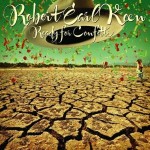 Robert Earl Keen’s “Ready for Confetti” hits number one on this week’s Americana Music Association Chart. That’s no surprise. The album first appeared on the chart a month before release and its climb has been relentless.
Robert Earl Keen’s “Ready for Confetti” hits number one on this week’s Americana Music Association Chart. That’s no surprise. The album first appeared on the chart a month before release and its climb has been relentless.
John Hiatt’s “Dirty Jeans and Mudslide Hymns” falls to third after a long run at the top. Elsewhere in the top ten, the Jayhawks (#2), Ollabelle (#6) and Guy Clark (#7) also move up.
New to the chart: The Gourds’ “Old Mad Joy” at #34, the genre-defying Pistol Annies’ “Hell on Heels” at #37, and Ray Bonneville’s “Bad Man’s Blood” at #39.
Guy Clark’s 70th birthday: A concert and album
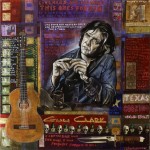 Some of the biggest names in roots, folk and Americana music will be on hand to celebrate Guy Clark’s musical legacy on Nov. 2 in Austin.
Some of the biggest names in roots, folk and Americana music will be on hand to celebrate Guy Clark’s musical legacy on Nov. 2 in Austin.
“Wish I Was In Austin: A 70th Birthday Tribute to Guy Clark,” which benefits the Center for Texas Music History, will feature performances by Shawn Colvin, Rodney Crowell, Joe Ely, Rosie Flores, Radney Foster, Terri Hendrix, Ray Wylie Hubbard, Jack Ingram, James McMurtry, The Trishas, Jerry Jeff Walker, Kevin Welch, Terry Allen and yes, Guy Clark.
The concert, scheduled for Nov. 2 at the Long Center, will also help promote an ambitious two-CD tribute album saluting Clark. “This One’s For Him: A Tribute to Guy Clark” will be released on November 8.
Ollabelle and Guy Clark move into Americana music top ten
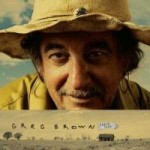 Ollabelle and Guy Clark are new to this week’s Americana Music Association chart, with their new albums ranked seventh and eighth respectively. The marketing and merchandising around the Guy Clark live CD “Songs and Stories” has been fascinating. It was available as an MP3 for one day on Amazon for $3.99, but you can also buy the CD, an autographed print and a T-shirt on Clark’s website for $125. Clearly he’s an artist for all income groups.
Ollabelle and Guy Clark are new to this week’s Americana Music Association chart, with their new albums ranked seventh and eighth respectively. The marketing and merchandising around the Guy Clark live CD “Songs and Stories” has been fascinating. It was available as an MP3 for one day on Amazon for $3.99, but you can also buy the CD, an autographed print and a T-shirt on Clark’s website for $125. Clearly he’s an artist for all income groups.
Robert Earl Keen’s “Ready for Confetti” moved up to fourth place, following John Hiatt, Gillian Welch and the Jayhawks, who again hold down the top three slots.
New to the chart is Greg Brown’s “Freak Flag.” (Pictured) Among the albums with the most adds this week are Joy Kills Sorrow’s “This Unknown Science” and Johnny Winter’s “Roots.”
David Olney dons his “Boots”
OK, it’s the least likely music video ever, but the sight of David Olney surrounded by mini-skirted dancers while he sings a Nancy Sinatra hit is pretty irresistible.
Lee Hazelwood wrote “Boots,” so it’s not a stretch for Olney to channel Hazelwood’s rough-hewn voice here. It’s goofy and we like it.
In other Olney news, the fine singer-songwriter did an interesting interview with F. Daniel Kent.
New live set from Guy Clark
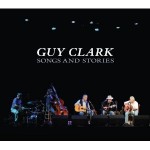 Peter Cooper of the Tennessean reports that Guy Clark will release a live CD recorded at Nashville’s Belcourt Theatre. Songs and Stories is scheduled for Aug. 16.
Peter Cooper of the Tennessean reports that Guy Clark will release a live CD recorded at Nashville’s Belcourt Theatre. Songs and Stories is scheduled for Aug. 16.
Two other Guy Clark live CDs are currently available:Together at the Bluebird Cafe with Steve Earle and Townes Van Zandt, and an Austin City Limits performance (also on DVD.)
